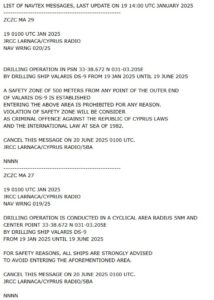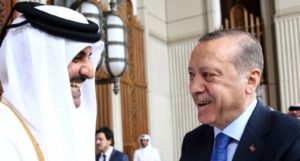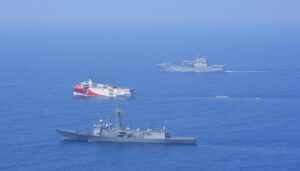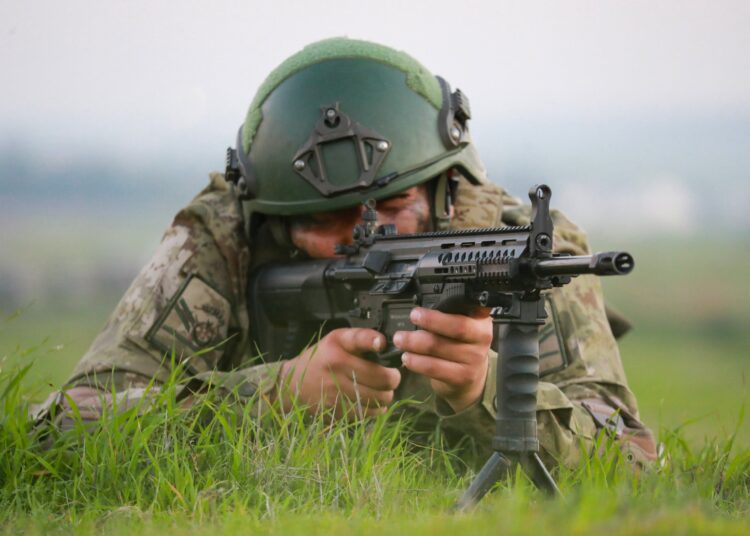Abdullah Bozkurt/Stockholm
Turkey and Qatar, close regional allies with shared support for Hamas and the Muslim Brotherhood, have found themselves at odds over QatarEnergy’s involvement in a hydrocarbon exploration agreement off the coast of Cyprus — an initiative Turkey has condemned as unlawful.
The dispute, simmering for several years, recently intensified behind closed doors between the two countries after Cyprus issued a navigational telex (NAVTEX) authorizing drilling operations in what is referred to as Block 5 of the eastern Mediterranean. The NAVTEX permits activities from December 24, 2024 to February 24, 2025, enabling ExxonMobil and QatarEnergy to proceed with the agreement they signed with Cyprus in December 2021.
Block 5 is located in Cyprus’ Exclusive Economic Zone (EEZ) and has been a focal point of dispute between Turkey and Cyprus, as it overlaps with areas Turkey claims as part of its continental shelf. In the development of gas fields in this block, QatarEnergy has a 40 percent stake in the production-sharing agreement with Cyprus, while ExxonMobil holds the remaining 60 percent.
On January 16 Cyprus issued a second NAVTEX, announcing that the VALARIS DS-9 drill ship would conduct operations in Block 5 until June 19, 2025.
The government of Turkish President Recep Tayyip Erdogan has yet to issue an official or public reaction. The only remark came from unnamed sources at General Staff headquarters, who reportedly told local media on January 23 that Turkey would closely monitor the drilling in Block 5 and take necessary action to safeguard its interests.
“The navigational warning issued by the Greek Cypriot Administration lies outside our Maritime Jurisdiction Area, approximately 11.5 miles (22 kilometers) south of it. In this context, we are closely monitoring the activities of the ship in question, which commenced on January 19, 2025,” the sources said.
Navtex messages issued by Cyprus regarding drilling in its exclusive economic zone:

The General Staff also pledged to safeguard the rights and interests of Turkey as well as those of the Turkish Republic of Northern Cyprus (TRNC) — a breakaway state recognized only by Turkey. Ankara exerts strong influence in the governance of the TRNC, maintains a large military presence there and provides a financial lifeline for its economy.
“The TRNC will continue to be resolutely defended, and any violation of our continental shelf will be immediately addressed on the ground. Our state has a deeper understanding of the issue than anyone else, evaluates it from all angles and determines the necessary steps to take. These steps will be implemented at the appropriate time,” sources attributed to the General Staff said.
The anonymous remark appears aimed at calming concerns among the Turkish public, addressing grievances raised by the opposition and buying time for the Erdogan government as it works to quietly resolve the crisis with Qatari officials.
The only formal response so far to the first NAVTEX came from Turkey at the United Nations through the TRNC’s envoy. On December 28, 2024 Turkey’s ambassador to the UN, Ahmet Yıldız, submitted a letter that included a communiqué from the TRNC’s representative, Mehmet Dânâ, who expressed concerns about the NAVTEX issued by Cyprus’s internationally recognized government.
“The TRNC has condemned the issuance of a navigational telex (NAVTEX) by the Greek Cypriot administration, allowing drilling operations in ‘block 5’ of the eastern Mediterranean, from December 24, 2024, to February 24, 2025. This action, undertaken in collaboration with ExxonMobil and Qatar Energy, has been described as a violation of the Turkish Cypriot people’s inherent rights to the island’s natural resources,” Dânâ said.
Dânâ argued that the Greek Cypriot administration does not represent the entire island, asserting that its unilateral actions — such as signing maritime border agreements, licensing energy companies and conducting exploration activities — are neither legitimate nor binding on the Turkish Cypriot people
“These actions disregard the need for consent and joint decision-making between the two communities on the island,” he added, pledging to take reciprocal measures to protect the TRNC’s rights to hydrocarbon resources in and around Cyprus.

Turkey’s Foreign Ministry, which was highly critical of the 2021 deal and adamant about not allowing “any foreign country, company, or vessel to conduct unauthorized hydrocarbon exploration activities within its maritime jurisdiction,” has so far remained silent on the consortium’s recent drilling operations
When criticized by the opposition in the past, Turkish officials claimed to have secured assurances from ExxonMobil and QatarEnergy that they would not operate in areas overlapping Turkey’s continental shelf. However, no written confirmation of such a pledge from the companies or the countries involved has been presented, prompting the opposition to dismiss it as an empty promise.
QatarEnergy is also cooperating with ExxonMobil to develop natural gas in Block 10, an area south of Cyprus that does not overlap with Turkey’s continental shelf — unlike Blocks 1, 4, 5, 6 and 7, which Turkey claims as part of its maritime jurisdiction.
Nevertheless, Turkey continues to object to activities in Block 10, arguing that the drilling violates the rights of the TRNC. Turkey remains resolute in its commitment to protecting the rights of the Turkish Cypriots, maintaining that the island’s natural resources should be shared equitably between Greek and Turkish Cypriots.
Turkey has proposed joint exploration initiatives or a revenue-sharing mechanism for hydrocarbons as interim measures until a comprehensive resolution to the Cyprus issue is achieved. However, these proposals have gained little traction in international forums.
A letter submitted to the UN by a representative of the breakaway Turkish Republic of Northern Cyprus:
To bolster its bargaining power, Turkey flexed its muscles by deploying its own drilling vessels to explore contested waters, often under the escort of Turkish naval forces. However, Ankara was forced to scale back such actions in 2020 following pressure from the United States and the European Union
In the meantime, Cyprus has strengthened its alliances both regionally and internationally, often at Turkey’s expense. Its partnerships with countries like Greece, Egypt and Israel, along with energy-focused initiatives such as the East Mediterranean Gas Forum (EMGF) — which excludes Turkey — have put Ankara in a defensive position.
While Turkey has continued to threaten Cyprus with military action, Nicosia has strengthened its strategic ties with the United States, which lifted its arms embargo on the island and has begun expanding its naval presence in the eastern Mediterranean.
It is clear that Qatar’s involvement in Cyprus’ hydrocarbon resources remains a point of friction for the Erdogan government. However, Ankara seems determined to avoid any rupture in its ties over this issue.
In recent years the Erdoğan government has significantly expanded its military presence in Qatar, establishing a base in 2014 and further expanding it in 2019. Turkey also came to the aid of the small Arab state in 2017, when Qatar faced a blockade by Saudi Arabia, the UAE, Bahrain and Egypt. During this time, Turkey provided diplomatic, military and logistical support to Qatar.

There has also been a divergence between Turkish President Erdogan’s personal interests in Qatar and the future direction envisioned by Turkey’s national security establishment. Erdogan is believed to have invested parts of his substantial wealth — accumulated through kickbacks and bribes — in Qatar, leveraging his friendship with the ruling al-Thani family to funnel and launder illicit gains through the Qatari financial system.
A significant portion of Qatari investment in Turkey is believed to originate from these illicit funds, which are controlled through intermediaries by Erdogan’s family.
There is no doubt that both countries are ideologically aligned in promoting an Islamist agenda abroad, actively supporting the Muslim Brotherhood network, Hamas and other armed jihadist groups across the Middle East, Africa and beyond.
Out of concern for protecting his political, ideological and financial interests in Qatar, President Erdogan seems willing to overlook QatarEnergy’s involvement in developing hydrocarbons off the coast of Cyprus. Given his control over Turkish media, all branches of government and a co-opted political opposition, he has the ability to present QatarEnergy’s involvement to the public in a way that safeguards his political future.












